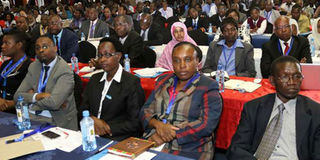Students to choose career path in lower secondary

Education stakeholders follow proceedings during the National Education Reforms Conference on March 30, 2016 in Nairobi. Secondary school students will specialise in the subjects they wish to pursue in tertiary institutions, if the radical reforms take effect. PHOTO | JEFF ANGOTE | NATION MEDIA GROUP
What you need to know:
- Learning areas have been divided into three categories — arts and sports; social sciences; and science, technology, engineering and mathematics.
- Under sports, students will pursue sports, performing arts and visual arts while social sciences options will be languages and literature, humanities and business studies.
- The Stem option will have pure and applied sciences, engineering and technical studies.
- Subjects to be taught in lower primary will include literacy, Kiswahili, English and indigenous languages, as well as mathematical and environmental activities
Students in secondary school will specialise in the subjects they wish to pursue in tertiary institutions, if the radical reforms contained in the latest curriculum review proposals take effect.
In a new structure of subjects prepared by the Kenya Institute of Curriculum Development, learning areas have been divided into three categories: arts and sports; social sciences; and science, technology, engineering and mathematics (Stem).
The curriculum developer also proposed that a pupil spend two years in nursery school, six in primary, three in lower secondary and three more in upper secondary — totalling 14.
Under sports, students will pursue sports, performing arts and visual arts while social science options will be languages and literature, humanities and business studies. The Stem option will have pure and applied sciences, engineering and technical studies.
Subjects to be taught in lower primary will include literacy, Kiswahili, English and indigenous languages, as well as mathematical and environmental activities (science, social and agriculture activities).
Others are hygiene and nutrition activities; moral, religious and life skills activities; and movement and creative activities (art, craft, music and physical education).
In upper primary, pupils will be taught Kiswahili, English, home science, agriculture, science and technology, mathematics, religious studies, moral and life skills education, creative arts (art, craft and music), physical and health education, social studies (citizenship, geography and history) with an option of foreign languages (Arabic, French, German, Chinese) and indigenous languages.
“By [the] end of early years education, the learner should be able to communicate appropriately using verbal or non-verbal modes, demonstrate basic literacy and numeracy skills and apply digital literacy skills for learning and enjoyment,” states the proposal that seeks to move the system from rote learning to competency-based education.
The proposal of subjects will be presented to the National Curriculum Reforms Conference soon, following postponement of last week’s meeting.
CURRICULUM REFORMS
The objective of the conference will be to disseminate the Basic Education Curriculum Framework and update Kenyans on the milestones achieved in curriculum reforms.
At junior secondary, a learner will be required to take the 12 core subjects — including English, Kiswahili, mathematics, integrated science, health education, pre-technical and pre-vocational education, social studies, religious education, business studies, agriculture, life skills education, sports and physical education.
They will also take a minimum of one and a maximum of two subjects according to personalities, abilities, interests and career choices.
The optional subjects are home science, computer science, performing arts, foreign languages (German, French, Chinese and Arabic), Kenya Sign Language, indigenous languages and visual arts.
In senior secondary, a student will take two core subjects irrespective of the pathway identified. They include community service learning (life skills, citizenship, entrepreneurship, financial literacy and research) and physical education.
“The pathways provide the learner with opportunities to begin specialisation in a specific area of personality, interest, ability and career choice,” adds the proposal.
Mother tongue will now be among subjects taught in lower primary school but will be optional in upper primary and secondary school.
From upper primary to senior secondary, learners will choose between indigenous language and foreign languages such as Arabic, French, German and Chinese and those pursuing languages and literature will pursue mother tongue.
Other subjects set to be introduced include reproductive health, which will touch on human sexuality, and family life, which will be cross-cutting in all subjects, while ICT will be a delivery tool for all learning areas.
A subject touching on contemporary issues will also be mandatory from lower primary to senior secondary school, as well as physical education.





